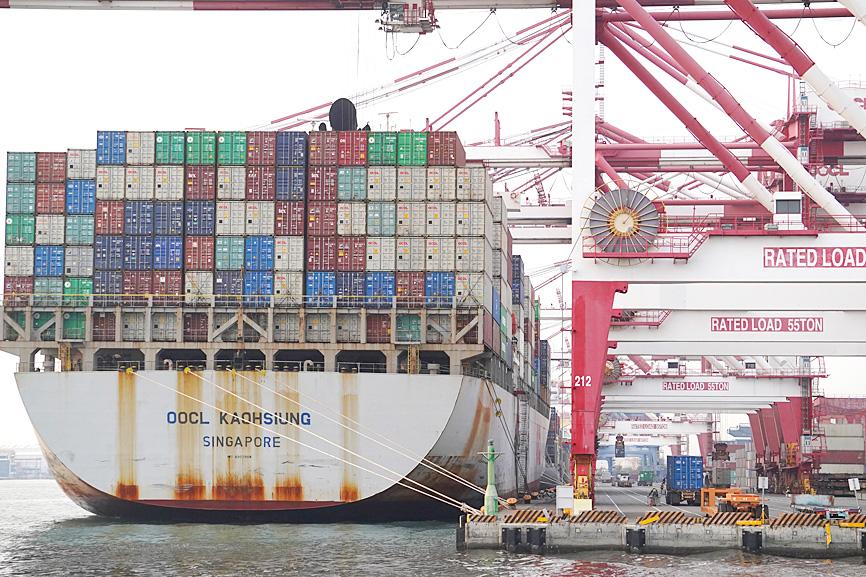Export orders hit a new record of US$51.6 billion last month, growing for an eighth straight month on an annual basis, bolstered by strong demand for smartphones, game consoles and 5G-related applications, the Ministry of Economic Affairs said yesterday.
The figure represented a monthly expansion of 3.1 percent from US$50.03 billion and 9.1 percent from US$47.28 billion a year earlier.
Export orders have continued to trend up this month, likely reaching US$51 billion to US$52.5 billion, the ministry said.

Photo: CNA
That would represent an annual growth of 14.53 to 17.89 percent from US$44.53 billion in November last year.
“The release of a major international smartphone products, as well as continued strong demand for ICT [information and communications technology] products has given us another strong month,” Department of Statistics Director Huang Yu-ling (黃于玲) said. “Panel makers told us that demand is outpacing supply.”
Orders for ICT products grew 22.2 percent month-on-month, or 4.4 percent annually, to US$17 billion last month, ministry data showed.
Electronic products weighed in at US$15.2 billion, down 5.2 percent month-on-month, but up 17.5 percent year-on-year.
Optical products dropped 5.5 percent month-on-month to US$2.3 billion last month, but registered an annual growth of 16.8 percent.
“September was probably the absolute peak for electronic products orders, but we can see from the year-on-year growth that the COVID-19-related demand for electronic products is still going strong,” she said.
Orders for basic metals were US$2.3 billion, up 6.1 percent month-on-month and 11.5 percent year-on-year.
Huang attributed the growth to recent increases in international steel prices.
Orders for machine tools shrank 1.3 percent month-on-month to US$1.9 billion, but grew 13.2 percent annually.
Orders for petrochemical products inched up 0.4 percent to US$2.1 billion last month from a month earlier, representing an annual expansion of 13.1 percent.
“Demand for consumer products is warming up,” Huang said.
Regionally, the US accounted for US$17 billion orders last month, up 13.6 percent month-on-month and 17.1 percent year-on-year.
China and Hong Kong accounted for US$11.8 billion in orders, down 18 percent month-on-month, but up 10.7 percent year-on-year.
The EU accounted for US$11.4 billion in orders, up 29.8 percent month-on-month, but down 0.1 percent year-on-year.
ASEAN came in fourth, with US$4.1 billion in orders, down 6.9 percent month-on-month, but up 6.1 percent year-on-year.
Due to the strength of the local currency, export orders in New Taiwan dollar terms last month only grew 2.7 percent versus 9.1 percent when calculated in US dollars.
The impact on Taiwanese companies is still “mostly manageable,” Huang said.
“Most larger companies hedge for foreign exchange fluctuations,” she said. “They also tend to be price-setters who can pass on the cost of a stronger NT dollar to their customers.”
However, she acknowledged that small and medium-sized enterprises “would be hurting.”

In Italy’s storied gold-making hubs, jewelers are reworking their designs to trim gold content as they race to blunt the effect of record prices and appeal to shoppers watching their budgets. Gold prices hit a record high on Thursday, surging near US$5,600 an ounce, more than double a year ago as geopolitical concerns and jitters over trade pushed investors toward the safe-haven asset. The rally is putting undue pressure on small artisans as they face mounting demands from customers, including international brands, to produce cheaper items, from signature pieces to wedding rings, according to interviews with four independent jewelers in Italy’s main

Japanese Prime Minister Sanae Takaichi has talked up the benefits of a weaker yen in a campaign speech, adopting a tone at odds with her finance ministry, which has refused to rule out any options to counter excessive foreign exchange volatility. Takaichi later softened her stance, saying she did not have a preference for the yen’s direction. “People say the weak yen is bad right now, but for export industries, it’s a major opportunity,” Takaichi said on Saturday at a rally for Liberal Democratic Party candidate Daishiro Yamagiwa in Kanagawa Prefecture ahead of a snap election on Sunday. “Whether it’s selling food or

CONCERNS: Tech companies investing in AI businesses that purchase their products have raised questions among investors that they are artificially propping up demand Nvidia Corp chief executive officer Jensen Huang (黃仁勳) on Saturday said that the company would be participating in OpenAI’s latest funding round, describing it as potentially “the largest investment we’ve ever made.” “We will invest a great deal of money,” Huang told reporters while visiting Taipei. “I believe in OpenAI. The work that they do is incredible. They’re one of the most consequential companies of our time.” Huang did not say exactly how much Nvidia might contribute, but described the investment as “huge.” “Let Sam announce how much he’s going to raise — it’s for him to decide,” Huang said, referring to OpenAI

The global server market is expected to grow 12.8 percent annually this year, with artificial intelligence (AI) servers projected to account for 16.5 percent, driven by continued investment in AI infrastructure by major cloud service providers (CSPs), market researcher TrendForce Corp (集邦科技) said yesterday. Global AI server shipments this year are expected to increase 28 percent year-on-year to more than 2.7 million units, driven by sustained demand from CSPs and government sovereign cloud projects, TrendForce analyst Frank Kung (龔明德) told the Taipei Times. Demand for GPU-based AI servers, including Nvidia Corp’s GB and Vera Rubin rack systems, is expected to remain high,